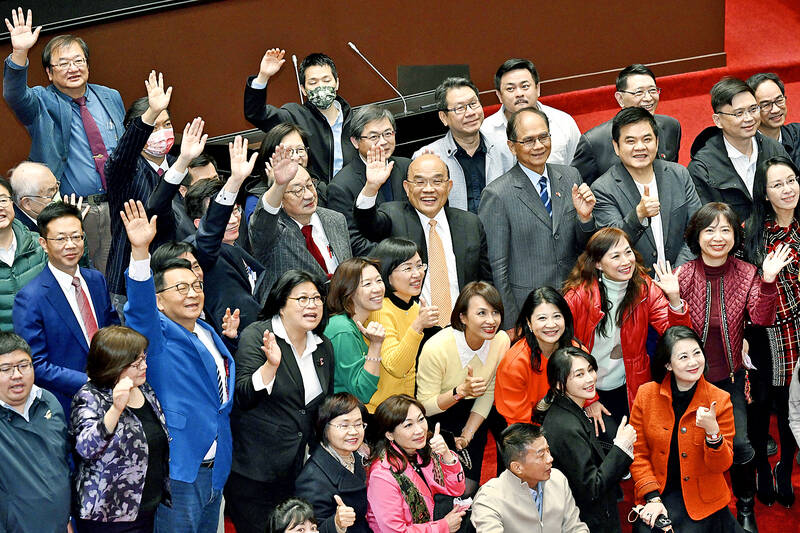Premier Su Tseng-chang (蘇貞昌) yesterday said he and all other members of the Cabinet would resign to help President Tsai Ing-wen (蔡英文) appoint a new team to implement her policies.
Su made the announcement on Facebook after an hour-long meeting with the president following the legislature’s approval of the government’s general budget for this fiscal year of NT$2.69 trillion (US$88.6 billion).
The move came after the Democratic Progressive Party’s (DPP) defeats in the local elections on Nov. 26 last year and Tsai’s resignation as DPP chairperson in their wake.

Photo: Lo Pei-te, Taipei Times
Prior to the meeting with Tsai, Su visited the legislature and thanked lawmakers for passing the budget, in line with past practice after the approval of an annual general budget.
Su, who became premier in 2019 after the DPP’s losses in local elections the previous year, said that “over the past four years, serving the country and the public has been an honor.”
Su said he tendered his resignation to the president immediately after the election defeats in November, but Tsai at the time asked him to stay on until the budget has been passed.
He agreed with Tsai that his immediate departure would have caused a delay to budget negotiations, Su said.
However, now it is time to lead the Cabinet in stepping down, Su said, adding that it would put Tsai in a better position to implement existing and new policies.
Presidential Office spokesman Xavier Chang (張惇涵) said Tsai thanked Su for his hard work over the past four years.
The government would work to appoint a new Cabinet over the Lunar New Year holiday, Chang said.
The government would review candidates and make appointments as soon as possible to ensure that government affairs and policy implementation are not delayed, Chang added.
Additional reporting by Wu Su-wei, Hsieh Chun-lin and CNA

MAKING WAVES: China’s maritime militia could become a nontraditional threat in war, clogging up shipping lanes to prevent US or Japanese intervention, a report said About 1,900 Chinese ships flying flags of convenience and fishing vessels that participated in China’s military exercises around Taiwan last month and in January have been listed for monitoring, Coast Guard Administration (CGA) Deputy Director-General Hsieh Ching-chin (謝慶欽) said yesterday. Following amendments to the Commercial Port Act (商港法) and the Law of Ships (船舶法) last month, the CGA can designate possible berthing areas or deny ports of call for vessels suspected of loitering around areas where undersea cables can be accessed, Oceans Affairs Council Minister Kuan Bi-ling (管碧玲) said. The list of suspected ships, originally 300, had risen to about 1,900 as

Japan’s strategic alliance with the US would collapse if Tokyo were to turn away from a conflict in Taiwan, Japanese Prime Minister Sanae Takaichi said yesterday, but distanced herself from previous comments that suggested a possible military response in such an event. Takaichi expressed her latest views on a nationally broadcast TV program late on Monday, where an opposition party leader criticized her for igniting tensions with China with the earlier remarks. Ties between Japan and China have sunk to the worst level in years after Takaichi said in November that a hypothetical Chinese attack on Taiwan could bring about a Japanese

The WHO ignored early COVID-19 warnings from Taiwan, US Deputy Secretary of Health and Human Services Jim O’Neill said on Friday, as part of justification for Washington withdrawing from the global health body. US Secretary of State Marco Rubio on Thursday said that the US was pulling out of the UN agency, as it failed to fulfill its responsibilities during the COVID-19 pandemic. The WHO “ignored early COVID warnings from Taiwan in 2019 by pretending Taiwan did not exist, O’Neill wrote on X on Friday, Taiwan time. “It ignored rigorous science and promoted lockdowns.” The US will “continue international coordination on infectious

DEEP-STRIKE CAPABILITY: The scenario simulated a PLA drill that turned into an assault on Taiwan’s critical infrastructure, with the launchers providing fire support Taiwan yesterday conducted this year’s first military exercises at Longsiang Base in Taichung, demonstrating the newly acquired High Mobility Artillery Rocket System’s (HIMARS) ability to provide fire support and deep-strike capabilities. The scenario simulated an attack on Penghu County, with HIMARS trucks immediately rolling into designated launch areas and firing barrages at the Wangan (望安) and Cimei (七美) islands, simulating the provision of fire support against invading forces. The HIMARS are supposed to “fire and leave,” which would significantly increase personnel and equipment survivability, a military official said. The drill simulated an exercise launched by the Chinese People’s Liberation Army (PLA) Eastern